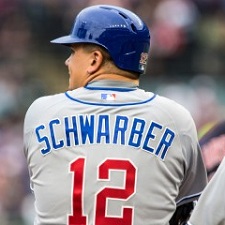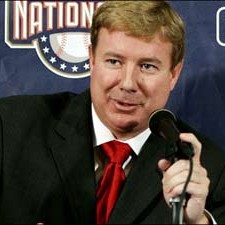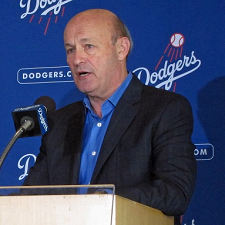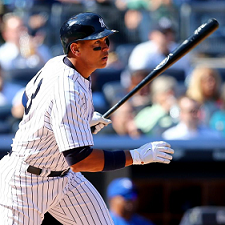IT’S THE JUNE CALL-UP SEASON
Sunday, June 28th, 2015Kris Bryant and Addison Russell were the talk of the first couple of weeks of the season because the Chicago Cubs kept them in the minor leagues longer than necessary to deprive them of a complete year of service time and insure their presence on the Cubs’ roster for an extra year.
Now the focus is on the Houston Astros, 100-game losers each of the past three seasons but the class of the American League West this season.
The Astros seem to be loaded with good young players, and although their $71 million payroll is the majors’ second smallest, salary arbitration makes payrolls grow by leaps and bounds so the longer the Astros can hold off that growth the happier owner Jim Crane will be.
With that in mind, the Astros waited until June 8 to promote Carlos Correa, and with a maximum of 2 years and 119 days he can attain he will not have enough service time to be a Super Two after the 2017 season.
At the age of 20, on the other hand, Correa, the first player picked in the 2012 draft, promises to be a super player. A shortstop and Puerto Rican native, he has excelled in his first 19 games, hitting .301, slugging 5 home runs in 83 at-bats, driving in 15 runs and a posting a .566 slugging percentage.
Although the Astros are surprisingly dominating the American League West, they just might want to wonder how much more dominant they might be had they called up Correa a couple of weeks earlier. General Manager Jeff Luhnow did not return a telephone call to discuss the matter.
Management officials, as highly ranked as Commissioner Rob Manfred, have said clubs have the right to make personnel decisions. An arbitrator established that right in 1986, and Manfred noted that collective bargaining negotiations in recent years have failed to alter that policy.
However, while arguing the legality of the issue, Manfred et al have ignored the integrity of it. If players like Correa and Bryant could help their teams win more games by being in the majors sooner, they would enhance the teams’ chances of reaching the playoffs and winning the World Series.
Isn’t that what fans want to see? Don’t teams have an obligation to put their best players on the field? Isn’t Manfred responsible for and obligated to seeing that teams put their best on the field?
In recent labor negotiations Manfred was the owners’ chief negotiator, and his job was to see that the owners got what they wanted. On the issue of service time and manipulation of it, he succeeded.
That’s why Jim Crane can save money on Carlos Correa and others.
The Astros also waited until June 10 to call up Vincent Velasquez, a 23-year-old right-handed pitcher, who last Friday night shut out the Yankees on three hits for 6 1/3 innings before giving up two more hits and leaving the game. He will gain a maximum of 117 days of service time this year, leaving him short of Super Two status, just like the Astros appear to have planned it.
 The Astros, however, made Lance McCullers Jr. an exception, summoning the 21-year-old right-handed pitcher May 18. The 41st player chosen in the 2012 draft, the son of the former major league pitcher has responded with a 3-2 record and 2.33 earned run average. He can total 2 years and 140 days by the end of the 2017 season, which should be just enough to make him a Super Two.
The Astros, however, made Lance McCullers Jr. an exception, summoning the 21-year-old right-handed pitcher May 18. The 41st player chosen in the 2012 draft, the son of the former major league pitcher has responded with a 3-2 record and 2.33 earned run average. He can total 2 years and 140 days by the end of the 2017 season, which should be just enough to make him a Super Two.
In recent weeks, with the June call-up calendar on their front-office walls, teams have called up a bundle of young players from the minors, some of them too late to get the service time they need to qualify for salary arbitration when their time comes.
Here are some June call-ups of recent years: Andrew McCutchen, Giancarlo Stanton, Chris Archer, Gerrit Cole, Stephen Strasburg, Anthony Rizzo, Yasiel Puig, Wil Myers, Gregory Polanco, Mike Moustakas, Pedro Alvarez, Carlos Santana, Gordon Beckham.
The players who qualify for arbitration are those with at least three years of major league service and the Super Two’s, the top 22 percent of players who have between two and three years of service.
In four salary arbitration periods under the current collective bargaining agreement, the service time of the last Super Two has been 2 years and 146 days in 2012, 2 and 139 in ’13, 2 and 122 in ’14 and 2 and 133 this year.
The list of Super Two’s is not determined until the season is finished and every player’s service time is known. However, management and union officials have an idea before then of which category players will fall. The labor relations department in the commissioner’s office gives clubs its best estimate on where the cutoff will be, and clubs plan accordingly with their minor leaguers who are major league-ready, balancing their decisions on the basis of finances and needs.
For example, Byron Buxton, Minnesota’s rookie center fielder, played his first major league game June 14. If he remains on the Twins’ roster – he is hitting .189 – or the disabled list, where he is now with a sprained thumb, he will finish the year with 113 days of service time.
After two more full seasons, he would have 2 years and 113 days and would fall well short of Super Two status.
Francisco Lindor, Cleveland’s rookie shortstop, came up the same day as Buxton and would be in the same service-time position. Lindor was hitting .262 at the start of Sunday’s game.
Joey Gallo, a Texas rookie, who became a major leaguer June 2, will have a maximum of 125 service days at the end of the season and will very likely miss the Super Two cutoff. He has split his time between third base and the outfield and is hitting .225. He was the 39th pick in the 2012 draft.
A Gallo teammate, Chi Chi Gonzalez, arrived three days before Gallo and can reach 128 days. The 23rd pick in the 2013 draft, the right-hander went into his scheduled start against Toronto Sunday with a 2-2 record and 2.27 e.r.a. in 5 starts.
Matt Wisler, whom Atlanta acquired from San Diego in the Craig Kimbrel trade opening day, can get only 108 days of service time this season. He limited the Mets to 1 run in his debut June 19.
Here are a few other pitchers who recently became major leaguers:
- Eduardo Rodriguez, a Boston left-hander from Venezuela, was called up May 28. With 3 wins and 2 losses in six starts, he is the only Red Sox starter with a winning record. They obtained him from Baltimore for Andrew Miller last July 31.
- Justin Nicolino, a left-handed pitcher, was added to the Miami roster June 20. He was one of 12 players Toronto and Miami swapped in a November 2012 trade.
- Taylor Jungmann was Milwaukee’s first-round selection in the 2011 draft, the 12th player chosen over-all, and the Brewers promoted him June 9. He has a 2-1 record and 2.74 e.r.a. in 4 starts.
Several players had September call-ups last season, then had their return this season delayed. One of those was Rusney Castillo, a Cuban outfielder.
Castillo, who turns 28 next week, spent 12 days with the Red Sox last September and hit well (.333 average, .400 on base, .528 slugging) but didn’t join the Red Sox this season until May 22. His stay lasted only 33 days and 26 games, during which his offensive numbers (.230/.260/.284) earned him a trip back to the minors.
Castillo, though, doesn’t have to worry about salary arbitration and Super Two’s. The Red Sox signed him last August to a seven-year, $72.5 million contract.
The best late call-up story, though, may belong to Kyle Schwarber, a 22-year-old catcher,  who was the fourth player chosen in the 2014 draft. The Cubs brought up Schwarber June 16 but not to catch. They had two interleague series – with Cleveland and Minnesota – in American League parks and needed a designated hitter.
who was the fourth player chosen in the 2014 draft. The Cubs brought up Schwarber June 16 but not to catch. They had two interleague series – with Cleveland and Minnesota – in American League parks and needed a designated hitter.
They went all the way to Class AA for him, and Schwarber dazzled them. In 6 games, he stroked 8 hits, including a home run, in 22 at-bats for a .364 average, had a 4-hit game and had .391 on-base and .591 slugging percentages.
He was then sent back to the minors, though to Class AAA.
Schwarber’s performance was more impressive than that of Theo Epstein, the Cubs’ president of baseball operations. Speaking about Schwarber, the graduate of Yale University and University of San Diego Law School was quoted as saying, “It was a best-case scenario for as well as it could have went.”

 “George became concerned that he would leave Yankee Stadium with stuff he didn’t have a right to,” said a former baseball executive familiar with the incident.
“George became concerned that he would leave Yankee Stadium with stuff he didn’t have a right to,” said a former baseball executive familiar with the incident. boss then and Los Angeles Dodges’ president now. “There was no wrongdoing on Jim’s part. There was never any credible allegations that Jim did anything. Nothing was found to lead to that conclusion. I don’t believe today there was any shred of truth to it. As to money going to anyone in our front office, there was no finding that it did.”
boss then and Los Angeles Dodges’ president now. “There was no wrongdoing on Jim’s part. There was never any credible allegations that Jim did anything. Nothing was found to lead to that conclusion. I don’t believe today there was any shred of truth to it. As to money going to anyone in our front office, there was no finding that it did.”
 I am both delighted and bothered that ESPN has the book. I am delighted because I have long wanted the book to become public so that the Rose sycophants who for too long denied the truth will see it for themselves.
I am both delighted and bothered that ESPN has the book. I am delighted because I have long wanted the book to become public so that the Rose sycophants who for too long denied the truth will see it for themselves.